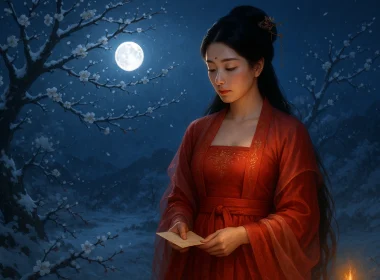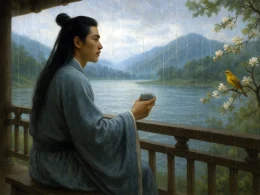I awake light-hearted this morning of spring,
Everywhere round me the singing of birds --
But now I remember the night, the storm,
And I wonder how many blossoms were broken.
Original Poem
「春晓」
孟浩然
春眠不觉晓,处处闻啼鸟。
夜来风雨声,花落知多少。
Interpretation
Composed during Emperor Xuanzong's Kaiyuan era when Meng Haoran lived in seclusion near Xiangyang's Lumen Mountain, this poem captures a spring morning with refreshing naturalness. Through delicate brushstrokes, it paints both the season's beauty and the poet's sensitive contemplations - a miniature masterpiece radiating love for nature and wistful existential awareness.
First Couplet: "春眠不觉晓,处处闻啼鸟。"
Chūn mián bù jué xiǎo, chù chù wén tí niǎo.
Spring slumber ignores dawn's coming; everywhere, birdsongs greet awakening.
The poet prioritizes auditory sensation. "Ignores dawn" conveys serene indulgence in spring nights, while "everywhere" spatially expands the avian chorus, immersing readers in valley woods teeming with seasonal vitality.
Second Couplet: "夜来风雨声,花落知多少。"
Yè lái fēngyǔ shēng, huā luò zhī duōshǎo.
Last night's wind and rain whispers - who knows how many blossoms fell?
Memory shifts from dawn to night. The whispered storm evokes melancholy, drawing mind's eye to fallen petals. This subtle turn from "spring's joy" to "spring's passing" reveals the poet's cherish of ephemeral beauty, deepening the poem's emotional resonance.
Holistic Appreciation
"Spring Dawn" exemplifies scene-emotion fusion. Framed by a spring morning, it moves from sensory delight to philosophical reflection. The first couplet's lively avian celebration contrasts the second's elegiac floral loss, creating emotional undulation without artifice. Through minimal elements - night, dawn, birdsong, storm - the poem mirrors nature's cycles while embodying human sensitivity to life's transience. Its apparent simplicity belies profound craftsmanship.
Artistic Merits
- Minimalist profundity: Commonplace details (sleep, birds, rain) conjure universal wonder
- Temporal fluidity: Dawn memories of night create poetic time loops
- Sensory layering: Auditory dominance (birds, storm) enhances immersive quality
- Emotional counterpoint: Joy/sorrow coexist like spring's dual nature
Insights
This poem teaches us to detect cosmic truths in mundane moments. The poet transforms routine awakening into meditation on impermanence - birdsong and storm whispers becoming metaphors for life's fleeting beauty. It suggests true poetic vision lies not in grand spectacle but in tender attention to existence's subtle rhythms. By honoring a single dawn's revelations, Meng Haoran gifts us an eternal lens: to cherish each transient blossom while awake to the deeper music of passing seasons.
Poem translator
Kiang Kanghu
About the poet

Meng Haoran (孟浩然), 689 - 740 AD, a native of Xiangyang, Hubei, was a famous poet of the Sheng Tang Dynasty. With the exception of one trip to the north when he was in his forties, when he was seeking fame in Chang'an and Luoyang, he spent most of his life in seclusion in his hometown of Lumenshan or roaming around.












